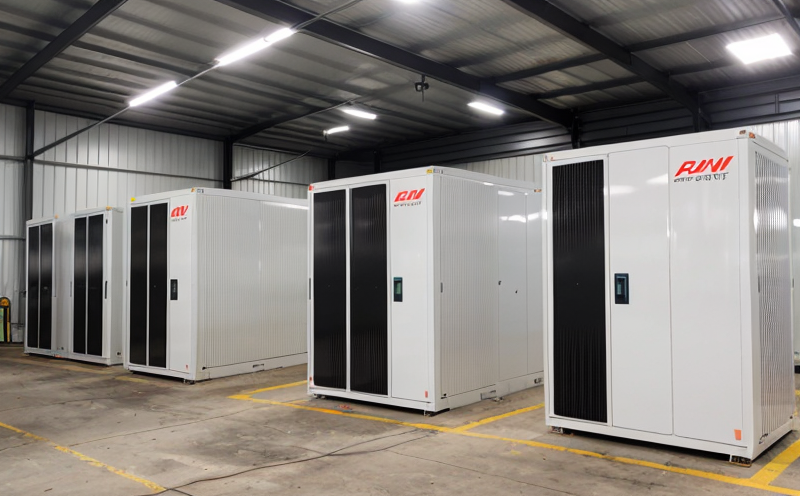ASTM D7862 Analytical Testing of Electrolytes in Batteries
The ASTM D7862 standard specifies a procedure for determining the chemical composition and concentration of electrolytes used in batteries. This method is particularly important as it ensures that the battery's performance, durability, and safety meet industry standards.
Electrolytes play a critical role in the operation of batteries by facilitating ion transport between electrodes during charge-discharge cycles. The quality and purity of these electrolytes are crucial for optimal battery performance. ASTM D7862 provides a standardized approach to analyze these electrolytes, thereby ensuring consistency and reliability across different manufacturing processes.
The test method involves several steps designed to extract and quantify the key components of the electrolyte solution. These include acids, bases, salts, solvents, and other additives that contribute to the overall chemistry of the battery electrolyte. By adhering strictly to ASTM D7862, laboratories can provide accurate results which are essential for regulatory compliance, quality assurance, and product development.
The procedure outlined in ASTM D7862 is a multi-step process that requires precise handling and analysis techniques. It involves dissolving the electrolyte sample in a solvent, filtering it to remove any particulates, and then analyzing the filtrate using various analytical methods such as titration, potentiometric measurements, or ion chromatography.
The accuracy of ASTM D7862 testing is paramount for several reasons:
- Quality Assurance: Ensures that batteries meet the required specifications regarding electrolyte composition and purity.
- Regulatory Compliance: Helps manufacturers adhere to local, national, and international regulations governing battery safety and performance.
- R&D Support: Provides data necessary for optimizing battery design and enhancing performance through iterative testing.
- Purchasing Decision: Assists in selecting high-quality batteries by verifying that they comply with industry standards.
By employing ASTM D7862, laboratories ensure that the electrolytes used in batteries are of the highest quality, which translates into better performing and safer products. This standard is widely recognized globally, ensuring interoperability and consistency across diverse markets and industries.
Benefits
The implementation of ASTM D7862 testing offers several significant advantages to stakeholders in the energy sector:
- Enhanced Battery Performance: Ensures that batteries operate efficiently, thus extending their lifespan and improving overall performance.
- Increased Safety Standards: Reduces the risk of operational hazards by identifying potential safety issues early on.
- Improved Compliance: Helps manufacturers meet stringent regulatory requirements, thereby avoiding costly penalties.
- Promotes Innovation: Encourages continuous improvement and innovation in battery technology through rigorous testing protocols.
- Consistent Quality: Ensures that all batteries produced adhere to the same high standards, leading to greater consumer trust.
- Competitive Advantage: Enables manufacturers to stay ahead of competitors by offering superior products backed by robust testing methodologies.
- Environmental Sustainability: By ensuring efficient battery use and longer life cycles, ASTM D7862 contributes to reduced waste and environmental impact.
- Data-Driven Decision Making: Provides reliable data that supports informed decisions at every stage of the product lifecycle.
The benefits extend beyond just manufacturers; they also affect consumers by providing them with safer, more efficient products. This comprehensive approach ensures that all parties involved in the battery industry benefit from ASTM D7862 compliance.
Customer Impact and Satisfaction
- Manufacturer Satisfaction: Ensures that batteries meet stringent quality control measures, leading to higher customer satisfaction.
- Consumer Confidence: By meeting international standards, manufacturers can build trust with their customers.
- Regulatory Compliance: Helps avoid legal issues and penalties associated with non-compliance.
- R&D Efficiency: Streamlines the research and development process by providing clear guidelines and reliable data.
- Purchasing Confidence: Enables procurement teams to make informed decisions based on verifiable test results.
- Market Leadership: Establishes a reputation for excellence, positioning manufacturers as leaders in their field.
- Sustainability Initiatives: Supports environmental sustainability efforts by promoting efficient use of resources and reduced waste.
- Data Transparency: Provides transparent data that can be used to communicate with stakeholders effectively.
By adhering to ASTM D7862, manufacturers not only enhance their products but also foster a culture of excellence within their organizations. This ultimately leads to higher customer satisfaction and loyalty, which are crucial for long-term success in the competitive energy sector.
International Acceptance and Recognition
The ASTM D7862 standard is widely recognized globally due to its rigorous testing procedures and comprehensive approach. This method has been adopted by numerous organizations worldwide, including regulatory bodies, research institutions, and industry leaders.
Regulatory bodies such as the U.S. Department of Energy (DOE) and European Union (EU) directives often reference ASTM D7862 in their guidelines for battery safety and performance. This standard ensures that batteries meet stringent requirements set forth by these entities, thereby facilitating international trade and cooperation.
Research institutions rely on ASTM D7862 to validate new technologies and materials used in battery manufacturing. The consistency provided by this standard allows researchers to compare results across different studies, fostering collaboration and innovation within the scientific community.
Industry leaders also use ASTM D7862 as a benchmark for quality assurance. Companies that adhere to these standards are recognized for their commitment to excellence, which enhances their reputation in both domestic and international markets.
The widespread acceptance of ASTM D7862 underscores its importance in the global energy sector. Its ability to provide reliable, consistent test results ensures that batteries perform reliably across various environments and conditions, contributing to a more sustainable future.





